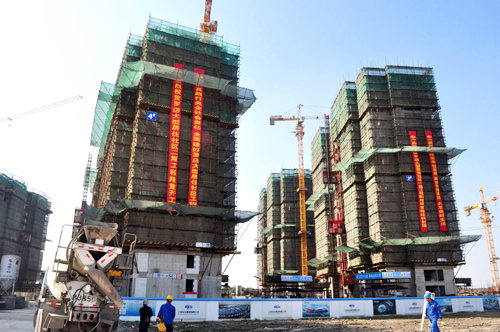|
 |
|
AFFORDABLE HOUSING: An affordable housing project under construction in Shanghai (YAN DAMING) |
For the Chinese economy, 2012 will be a year filled with uncertainties. With the Western world struggling with a fragile recovery, China's export growth has taken a hit, with expectations of even worse to come.
Domestically, concerns abounded that the country has gone too far with its monetary tightening, which may in turn sap the country's growth momentum. This dark prospect has placed an onus on policymakers to fine-tune their macroeconomic policies and steer the economy on a steady course.
For 2012, China will adhere to stable and consistent policies and retain its prudent monetary policy and proactive fiscal policy—the macroeconomic outline was mapped out at the annual Central Economic Work Conference (CEWC), China's top-level economic meeting, held on December 12-14 in Beijing.
At last year's CEWC, China pledged to take a prudent monetary stance for 2011, marking a switch from the moderately loose policy adopted to counter the 2008 financial crisis.
"The world economy is confronted with serious headwinds, with global trade weakening and the financial markets fluctuating," said the CEWC statement.
"Meanwhile, domestic downside risks are looming for the economy, and some enterprises are facing difficulties in operation," it said. "The inflation pressures remain and the financial sector is hidden with potential dangers."
"That means China must stay alert over the uncertainties and prepare countermeasures," it added.
The Chinese economy is feeling the chill of lackluster exports since the global economy remains on a slippery slope in large part due to the two-year sovereign debt crisis. The credit rating agency Standard & Poor's has recently put 15 euro zone nations on "credit watch" due to deepening economic and political turmoil in the region.
"If the global recession returns, China's exports may nose-dive 10-12 percent next year, taking around 2.25 percentage points off GDP growth, " said the Swiss investment bank UBS in a recent report. "In addition, the ripple effect will also filter through investments and consumptions."
UBS trimmed its forecast for China's economic growth in 2011 to 9 percent from a previous 9.3 percent to reflect weaker prospects in Western economies.
Domestically, signs are emerging that the once-robust growth engine is stalling as policymakers twisted hard on credit screws to quell inflation. Bearing the brunt of the heavy economic blows were smaller private firms that have found it harder to secure bank loans than state-owned enterprises. Reports have been flooding media outlets that east China's Zhejiang Province, a cradle of the private economy, is experiencing massive factory closures and bankrupt entrepreneurs are disappearing to avoid huge debts.
The purchasing managers index (PMI), a barometer of manufacturing activities, slumped to 49 percent in November. This was the first time that the index has dropped below the boom-bust line of 50 percent in 33 months."Judging from the PMI figures, China is experiencing its most difficult period since the global financial crisis in 2008 and the situation demands the Chinese Government loosens its monetary policies," said Liu Ligang, a researcher from ANZ Greater China.
The China Entrepreneurs Survey System, a research institution under the State Council, recently conducted a survey of more than 4,000 companies all over the nation, and 48.3 percent of the respondents said they have come under intense financial pressures because of the tightening measures.
The People's Bank of China, the central bank, has ordered interest rate hikes three times this year and increased the reserve requirement ratio six times.
The quickly cooling real estate market also became a significant drag on growth. Home buyers have stayed on the sidelines, draining life out of the once-exuberant market and dealing a blow to a series of related sectors like furniture and appliances.
| 